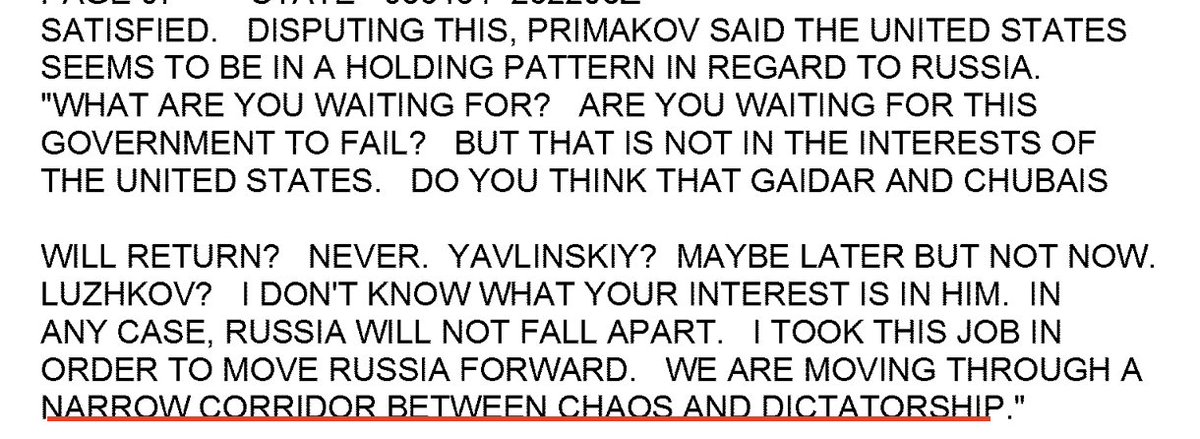
I've noticed there's a lot of public interest in what I make of Catherine Belton's Putin's People. Fine. Let me give another example of problematic sourcing, and I will use this as an opportunity to address broader issues about how we deal with authenticity of sources.
Belton's book begins with a remarkable conversation between "Putin's banker" and exiled oligarch Sergei Pugachev and the well-known Yeltsin associate Valentin Yumashev. The two discuss how Putin came to power and their role in his rise.
And at this point you even begin to wonder whether these were video - not audio - recordings. Otherwise, how would Belton know that Yumashev was "shaking his head sadly." 

Of course, if you read something like this, and you are a critical reader, you immediately want to know about the source, including whether the transcripts are genuine, whether they have been edited. Was Belton able to verify that the voices are those of Pugachev & Yumashev etc.
So you turn to the book. Here's where Belton talks about these tapes. That's it. But lots to unpack here. First of all, check out the hideous FSB plot to tape Pugachev's every meeting that he held in his office since the 1990s (presumably a lot!). 

The question that immediately comes to mind is why, if FSB were taping these meetings, they were found on his hard disk. OK, I am sure there's an explanation for this (for example, they could have secretly enabled a mic on his computer to record to the local hard disk).Plausible?
If so, surely the FSB were glad when the detectives in London were able to recover the hard disks for them (or is it tapes - since Belton also talks about "tapes"). But as a critical reader, I want to know more. I understand there are sensitivities and yet...
I want to know, for example, how Belton got a hold of these tapes. Were these audio files, or transcribed documents. When did the meeting take place? Were there other tapes ("every meeting since 1990s?"). Could she be sure that the tapes had not been tampered with etc.
Because the tape plays such a central role in the book - as a "clickbait" really - you expect some discussion in the footnotes. I am reminded here of Andrew Nathan's introduction to the Tiananmen Papers (which were also compiled by unknown persons). amazon.com/Tiananmen-Pape…
Here's how Nathan recounts how he came into the possession of high-level documents (whose authenticity was disputed then and is still disputed by some). He spends pages on describing how he finally decided to go with the project despite feeling that some docs were tampered with. 





You would not expect quite as much in this case but at least you'd expect a footnote. What do we have? Nothing. Not a single footnote, explaining what this crucial tape is, whether the author tried to verify its contents (given that she interviewed both Pugachev & Yumashev), etc.
We, as readers, are left to wonder whether Belton has had this tape from a reliable source, or whether perhaps she was fed disinformation, perhaps by Pugachev himself (since Pugachev clearly comes across in a positive light in the tape). These are serious issues.
Now, some readers might say: you are too picky. These are sensitive sources, of course Belton could not disclose them. Or: "I trust Belton because she is a first-rate Financial Times journalist" etc. All fair points.
But if you are a historian, you want to be able to assess the veracity of sources, or at least be permitted a fair judgment as to whether to believe a story or a spin. Belton denies us this judgment, which is what I find problematic.
I understand she is an investigate journalist. But I am a historian and I have my own (professional) views on how to evaluate evidence. As I have shown in previous tweets, this is far from being the only "problematic" footnote (or absence thereof).
Don't get upset with my analysis. I am not imposing my views. My role as a trained social scientist is to uphold certain standards of research, which is why I find it important to draw people's attention to problematic methodologies and stimulate a polite exchange of opinions.
• • •
Missing some Tweet in this thread? You can try to
force a refresh












